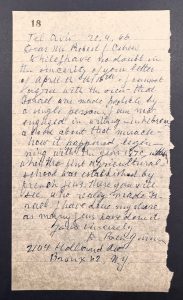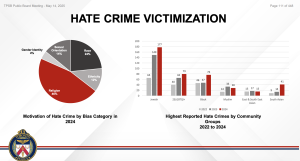TORONTO — A disciplinary committee of B’nai Brith Canada considering the proposed expulsion of more than 14 members adjourned last week without making a decision.
The three-person committee reserved its judgment after a hearing that lasted almost four hours, said lawyer Rochelle Cantor, who is representing the 14 long-serving B’nai Brith members. Cantor said the tribunal “conducted the hearing in the manner they saw fit to conduct it. I’m not certain if they are finished.”
Noting the hearing was closed to the public, Cantor said little about what transpired, repeating only earlier concerns she had raised that B’nai Brith had not disclosed the specific facts about each member that warranted expulsion. She pointed out, however, that B’nai Brith called no witnesses at the hearing.
At least 14 members were mailed letters in late November informing them they faced removal for conduct “unbecoming a member of BBC [B’nai Brith Canada] and contrary to the best interests of our organization.”
Among the allegations that accompanied the letter were that the members circulated information at the 2006 annual general meeting that “contained serious and unsubstantiated allegations against the organization and leadership.”
B’nai Brith’s executive committee, which referred a complaint to the disciplinary committee, also alleged an organization called Concerned Members of B’nai Brith Canada circulated e-mails that included “defamatory allegations of wrongdoing, both financial and otherwise.”
Cantor said she had not yet presented her case: “As far as I am concerned, the hearing is not over.”
Cantor, whose father is one of the B’nai Brith’s members facing expulsion, said she planned to call anywhere from 20 to 40 witnesses who would testify that members’ conduct was not unbecoming a member of the organization. She pointed out those facing expulsion have been members of B’nai Brith an average of 40 years. One, Lou Ronson, is the organization’s longest serving member, having joined the organization 68 years ago.
Approximately 60 supporters and potential witnesses gathered at the B’nai Brith building on Hove Street the night of the hearing. They were greeted by three uniformed police officers. Their presence, along with the disciplinary hearing itself, was the subject of a heated e-mail message circulated to a local lodge.
In the e-mail message, N.H. [Nate] Salter, past president and chair of the board of directors of Forestdale Heights Lodge stated: “I have been a loyal B’nai Brith member since 1955, and in the 53 years since I joined as a proud Jew, I have never heard about members of this organization committing acts of violence or civil disobedience. Yet at a meeting called on Monday, Jan. 21, wherein a so-called tribunal was being held that could have a deleterious effect on our president as well as others… paid police officers [were] on duty.
“To me this is the ultimate in disrespect to our lodge and our members, when we have taken the time to appear at the tribunal in support of our president. Did [B’nai Brith] think that a group of middle-aged Jews were going to storm the meeting and do acts of violence? What an insult to our members when [B’nai Brith] calls in police to restore order when no order has ever been breached.”
Ronson said the “policemen had a good time.”
They kibbitzed with the supporters. “They had nothing else to do. There was nobody creating any fuss or anything.”
Henry Gimpel, a past lodge president and chair of B’nai Brith’s Toronto regional co-ordinating committee, who is also facing expulsion, said he knew of no efforts to bring people to the hearing. Supporters were annoyed that they were not permitted to view the hearing.
Gimpel said he joked with the off-duty police, who were paid by the hour, saying, “What do you expect from older people, to fight, to burn down the building?”
He called their presence “a waste of money.”
When contacted by The CJN for a comment, B’nai Brith Canada responded with a written statement, reproduced here.
BBC’s statement to The CJN
In recent weeks, The CJN has devoted coverage to what can only be described as a public smear campaign against B’nai Brith Canada and its parent organization, B’nai Brith International. This attack campaign is being spearheaded by a tiny handful of disgruntled B’nai Brith members. The damaging and defamatory statements made by these individuals – which The CJN has repeatedly chosen to cover – does not reflect the overwhelming support that we have received from our loyal grassroots members, friends and donors from across the country, who have rallied behind us.
B’nai Brith Canada has fully observed due process and abided by its governing constitution in trying to put this matter to rest. The B’nai Brith International Court of Appeals ruled that there was no basis whatsoever to the complaints of this group. Despite the clear judgment rendered by a court of their choice, this fringe group has chosen to pursue a vendetta against B’nai Brith. It would appear that they have opted to put their own personal issues above the welfare of the organization in an attempt to impede our ability to carry out the important work we do on behalf of the entire Jewish community.
B’nai Brith Canada’s disciplinary committee, operating under the organization’s constitution, convened last week to hear complaints launched against these individuals by the executive board. This body provided the opportunity to the disgruntled members to present their views in a peer review setting.
Following The CJN’s extensive coverage of these individuals grievances, B’nai Brith learned that demonstrators were being asked to turn out in force. Off-duty police were therefore engaged in order to ensure security and decorum. In the end, only a handful of family members and friends turned out for the hearing.
Pending the review of the disciplinary committee, which is expected to render a decision shortly, it is inappropriate for either of the parties to further comment publicly at this time.






